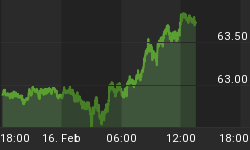On March 20, 2007 China's Central Bank governor, Zhou Zianochuan, had this to say about China's burgeoning reserves:
"Many people say that foreign exchange reserves in China are (already) large enough...We do not intend to go further and accumulate reserves" Zhou Xiaochuan
The above comments were made when China had a $1.2 trillion stockpile in foreign exchange reserves. Over the last 32-months this figure has almost doubled to $2.399 trillion (as of December 2009). The lesson, if otherwise unclear, is that China's policy 'intentions' are not necessary synonymous with policy actions.

China Says Buy Gold (on weakness)
Those that thought China was going to dump U.S. Treasuries and buy all the gold on the planet were disappointed by recent comments from Yi Gang, head of the State Administration of Foreign Exchange (SAFE). But for those in the know Yi's words simply meant more of the same:
"The US Treasury market is the biggest bond market in the world and our foreign exchange reserves are relatively large, so as you can imagine the US Treasury market is an important one for us... The international gold market is very limited. If I purchase gold on a massive scale, it will definitely push up global gold prices"
With Yi adding that "[gold's] yield is not very good from a 30-year point of view", it was of little surprise that the immediate reaction in the gold market was negative. However, upon closer investigation it was also clear that Yi was not indicating a policy shift so much as confirming that China would prefer to accumulate gold that it does not acquire from domestic production under favorable market conditions (or on weakness).
"So, as for suggestions from many friends that we should increase gold holdings, we will give prudent consideration to this, according to market conditions."
Suffice to say, when it comes to foreign reserves, gold, or the value of the Renminbi, policy rhetoric out of China is often intended to diffuse tensions with foreign policy makers and/or provide misdirection. Using the above comments as an example, is it coincidental that China is talking up its U.S. Treasury purchases a month before the U.S. Treasury could unleash the word 'currency manipulator' in a report? As for gold, while the notion that Yi is talking up SAFE's investment 'book' (or talking it down in order to add to it) may seem far fetched, remember that we live in a world where policy makers have resorted to 'elaborate rhetorical jousting' to try and devalue their currency. Is it really a stretch to conclude that China would like to talk speculators out of the gold market so that it might procure a larger footprint in the gold market?
As Yi highlights the fact that gold's performance over the last 30-years has been 'poor', it is worth remembering that China started accumulated gold in large part because it believes nearly 30-years of U.S. dollar hegemony will slowly come to an end. Accordingly, unless the Chinese growth story is about to meet a relatively abrupt end or the U.S. is about to do the unthinkable and adopt sound money policies, it isn't just likely that China will continue to accumulate gold - it is certain.
In short, don't be surprised when China feels like releasing the statistics that the country's gold holdings have grown significantly from the current (and dated) level of 1054 tons. The China/Gold/Reserve diversification theme(s) have been active for some time (1, 2, 3), and are likely to remain active for good reason: Gold is the only currency that can not be negatively impacted by central bank printing.
"Gold is not a bad asset, but currently a few factors limit our ability to increase foreign-exchange investment in gold"
















